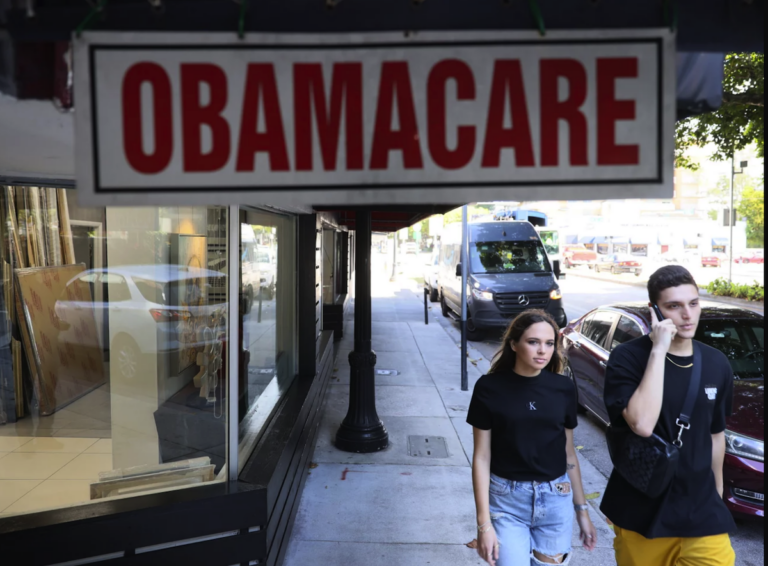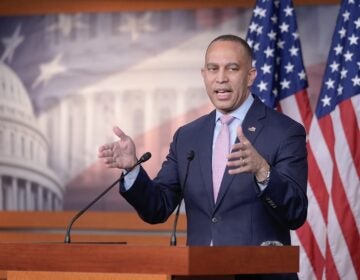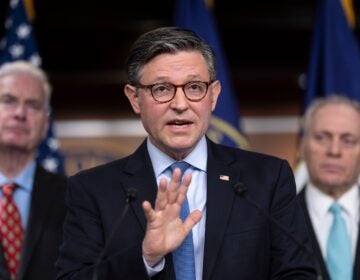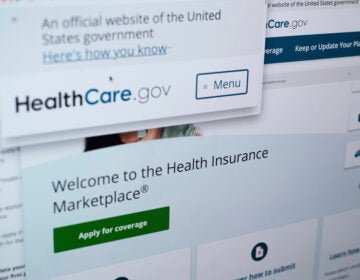On health policy, Biden and Trump both have records to run on — and stark contrasts
The two major presidential candidates have very different approaches to health policy. What are they, and how might they shape health care access over the next four years?

People have been pleasantly surprised to find Affordable Care Act insurance plans under $10 a month since President Biden has been in office. The plans were more expensive and fewer people bought them during Donald Trump's presidential term. (Joe Raedle/Getty Images)
Health care in the U.S. is undeniably expensive. This is a point that President Biden and former President Donald Trump actually agree on. They’ve both talked about the problems of costly prescription drugs, surprise emergency room bills and the need for price transparency in health care.
But in general, their ideas on how to address these problems with the health care system are very different.
Here are some ways that the two presidential candidates differ in their approach to health policy.
Obamacare feast or famine
Trump talked about the “disaster” of Obamacare all the time as president and nearly succeeded in repealing the whole Affordable Care Act (ACA). Although that effort failed, he did pull back federal support for the state marketplaces — all accessed via Healthcare.gov — where people who don’t get insurance through their job can go to buy a health plan.
A major way he did this was by slashing the budget for advertising and for navigators — staffers at nonprofits that get federal grants to walk people through the process of finding a plan and signing up.
“During the Trump administration, we went down to a budget of only $100,000 a year in those years,” says Jeremy Smith, a navigator with First Choice Services, based in West Virginia. “It was only just a couple of us working on the program.”
Then when Biden took office in 2021, Smith says, the change was dramatic. “Our funding increased by more than tenfold — we went from $100,000 a year to over a million dollars a year. So that was just huge — it just made our head swim,” he says, adding that the money allowed him to create remote offices around West Virginia and add bilingual staff.
Biden announced Friday that there would be $500 million available over the next five years for the navigator program.
Who has health coverage
Under Trump, enrollment in ACA insurance went down pretty much every year. Cynthia Cox of the health research organization KFF says that’s not surprising. When there’s no investment in advertising, people don’t have any idea these health insurance plans exist.
In addition to much higher spending on navigators and advertising, Biden increased subsidies to make the plans people were shopping for more affordable — most enrollees can get a plan with a premium of $10 a month or less. “Four years ago, premium prices — that was a big talking point for people, their inability to afford the premium prices,” says Katie Roders Turner of the Family Healthcare Foundation in Tampa Bay, Florida. “These past few open enrollments, people are really pleased at what they’re seeing as their options.”
One of those happy customers is Sidney Clifton. He’s 53 and lives in Pasco County, Florida, near Tampa. He had been on his wiedere’s insurance, but then he got divorced.
Clifton says he has health issues including diabetes, so he needed a comprehensive plan and a navigator helped him find one. After a federal subsidy, the monthly premium for his Blue Cross Blue Shield plan came to about $300 less than he had been paying for his wife’s employer-based plan.
“It’s really the best decision I ever made. I love it,” he says, adding that all his providers are in network and that the copays are manageable. He says he’d be happy to keep the plan for as long as he can, but it won’t change his plan to vote for Trump.
“I’m not selfish like most people,” he says. “What’s the best for America is best for America, and if that’s taking this stuff away, it’s taking this stuff away.” If Trump gets elected and he loses his health plan, he says he’d figure something else out — going without insurance, changing to a job with health benefits or even getting remarried.
With all of that, enrollment in the Affordable Care Act marketplaces has hit record highs nationally. More than 21 million people are now enrolled, and the insurance rolls grew the most in red states, according to a recent report from KFF. The biggest growth was in Texas, where enrollment tripled between 2020 and 2024.
Another factor is millions of people losing Medicaid in the last year as pandemic rules that allowed people to keep coverage expired. “What we’ve seen is that millions of people did make that transition onto ACA marketplace plans, which has helped keep the uninsured rate very low,” says KFF’s Cox.
The uninsured rate in 2023 was 7.7%, according to the Department of Health and Human Services, which is lower than it has ever been.
Cox says Trump hasn’t laid out what policy he would implement to improve the Affordable Care Act. “So what we have to work with is the former president’s record of what he did when he was president,” she says. “What he tried to do was to essentially deregulate health insurance.” If Trump is elected in November, she expects more of that deregulatory approach to health insurance.
Abortion and transgender health bans
There are some areas of health policy that Trump seems very interested in regulating: abortion and transgender health policy.
Since Roe v. Wade was overturned by the Supreme Court in 2022, the Biden administration has been battling in the courts with states that have enacted abortion bans — and Biden instructed federal agencies to protect access to abortion where possible.
The same is true for states passing laws about trans health policy. There are now 25 states with laws banning gender-affirming care for minors. The Biden administration has opposed those bans in the courts and through agency actions.
Trump has said he would take executive actions to limit access to gender transition at any age, not just for minors. On abortion, he has spoken proudly about how he’s responsible for overturning Roe v. Wade with his appointments to the Supreme Court, but in April, he said he wouldn’t sign a federal abortion ban, though he supported one in 2016. He would certainly reverse the current federal position that access to abortion is a right, and a Trump Justice Department would likely not argue in favor of abortion rights in pending cases in federal court.
The problem of high prescription drug prices
Both candidates have talked a lot about the high cost of prescription drugs. Biden has managed to get some significant health policy through, via the Inflation Reduction Act, which allowed Medicare to negotiate the price of several very expensive prescription drugs for the first time. He also capped out-of-pocket drug costs for people on Medicare. One challenge for his campaign is that some of the new laws take a while to take effect — and be noticed by voters. For instance, the cap for seniors won’t take effect until 2025.
Trump, as president, approved rules to allow drug importation from countries like Canada with cheaper drugs. The effort hasn’t really taken off because other countries aren’t eager to share their drug supply with U.S. customers. A conservative playbook called Project 2025 doesn’t mention drug importation but does call Medicare price negotiation “government price controls” and calls for the law creating that program to be repealed.
Some areas of agreement
There was a law passed under Trump called the No Surprises Act to protect patients from exorbitant emergency room bills. Biden has implemented that law.
Another area of some agreement is price transparency — the idea that if patients can see the prices of services from hospitals or their insurance company, they can shop to find the best price. That’s something that has bipartisan support.
In general, the areas of agreement are the exception, not the rule — these two candidates have extremely different ideas when it comes to the federal government’s role in health policy.

Get daily updates from WHYY News!
WHYY is your source for fact-based, in-depth journalism and information. As a nonprofit organization, we rely on financial support from readers like you. Please give today.





